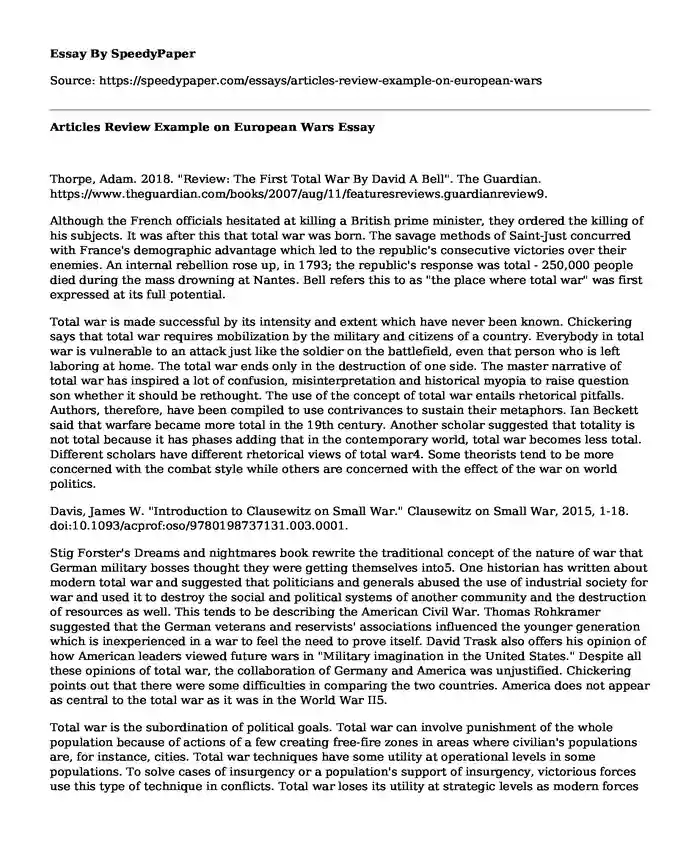Thorpe, Adam. 2018. "Review: The First Total War By David A Bell". The Guardian. https://www.theguardian.com/books/2007/aug/11/featuresreviews.guardianreview9.
Although the French officials hesitated at killing a British prime minister, they ordered the killing of his subjects. It was after this that total war was born. The savage methods of Saint-Just concurred with France's demographic advantage which led to the republic's consecutive victories over their enemies. An internal rebellion rose up, in 1793; the republic's response was total - 250,000 people died during the mass drowning at Nantes. Bell refers this to as "the place where total war" was first expressed at its full potential.
Total war is made successful by its intensity and extent which have never been known. Chickering says that total war requires mobilization by the military and citizens of a country. Everybody in total war is vulnerable to an attack just like the soldier on the battlefield, even that person who is left laboring at home. The total war ends only in the destruction of one side. The master narrative of total war has inspired a lot of confusion, misinterpretation and historical myopia to raise question son whether it should be rethought. The use of the concept of total war entails rhetorical pitfalls. Authors, therefore, have been compiled to use contrivances to sustain their metaphors. Ian Beckett said that warfare became more total in the 19th century. Another scholar suggested that totality is not total because it has phases adding that in the contemporary world, total war becomes less total. Different scholars have different rhetorical views of total war4. Some theorists tend to be more concerned with the combat style while others are concerned with the effect of the war on world politics.
Davis, James W. "Introduction to Clausewitz on Small War." Clausewitz on Small War, 2015, 1-18. doi:10.1093/acprof:oso/9780198737131.003.0001.
Stig Forster's Dreams and nightmares book rewrite the traditional concept of the nature of war that German military bosses thought they were getting themselves into5. One historian has written about modern total war and suggested that politicians and generals abused the use of industrial society for war and used it to destroy the social and political systems of another community and the destruction of resources as well. This tends to be describing the American Civil War. Thomas Rohkramer suggested that the German veterans and reservists' associations influenced the younger generation which is inexperienced in a war to feel the need to prove itself. David Trask also offers his opinion of how American leaders viewed future wars in "Military imagination in the United States." Despite all these opinions of total war, the collaboration of Germany and America was unjustified. Chickering points out that there were some difficulties in comparing the two countries. America does not appear as central to the total war as it was in the World War II5.
Total war is the subordination of political goals. Total war can involve punishment of the whole population because of actions of a few creating free-fire zones in areas where civilian's populations are, for instance, cities. Total war techniques have some utility at operational levels in some populations. To solve cases of insurgency or a population's support of insurgency, victorious forces use this type of technique in conflicts. Total war loses its utility at strategic levels as modern forces often experience defeats on the battlefield that threatens overall military failure.
Howard, Michael. War in European History. London: Oxford University Press, 2009.
A state of total war in the contemporary times would mean that every person on the planet is directly involved in the persecution of war. It has not happened yet, but the closest approximation was not the Hiroshima and Nagasaki incident but the Los Alamos, where scientists, during the testing of the atomic bomb, thought that the resultant heat would ignite the earth's atmosphere6.Wars continue to become even more significant, longer and more dependent on sophisticated machinery and chemicals, and by nearly every index, costly.
In Michael Howard's words, "wars became not only a conflict of armies but populations." In the modern era, the intersections of the realms have been more massive, transparent and immediate. The effects of total war have been significant in social, political and military concepts. Socially, it has brought a lot of propaganda, white feather movements - a symbol of cowardice that has been recognized in the by patriotic groups, by especially feminists to shame men who were not soldiers, among the British Empire6. Politically, nations have grown weaker. There has been forced employment as well as conscientious objectors. In the military perspective, women battalions have been on the rise. Engaging in total war today could suggest that governments have been given unlimited powers to introduce any regulation it considers necessary for wars effort.
Bibliography
Davis, James W. "Introduction to Clausewitz on Small War." Clausewitz on Small War, 2015, 1-18. doi:10.1093/acprof:oso/9780198737131.003.0001.
Howard, Michael. War in European History. London: Oxford University Press, 2009.
Thorpe, Adam. 2018. "Review: The First Total War By David A Bell". The Guardian. https://www.theguardian.com/books/2007/aug/11/featuresreviews.guardianreview9.
Cite this page
Articles Review Example on European Wars. (2022, May 09). Retrieved from https://speedypaper.net/essays/articles-review-example-on-european-wars
Request Removal
If you are the original author of this essay and no longer wish to have it published on the SpeedyPaper website, please click below to request its removal:
- Free Essay Sample on Automotive Advancements in Technology
- The Alienist and The Underdogs - Literary Essay Example
- Essay Example Describing Pro Bono Services
- Philosophy Essay Example: Indirect Realism and George Berkley's Idealism
- Innovation Trends in Sporting Events, Free Essay Example
- Free Essay. The Type of Art and Work That Hassan Wants to Create
- Free Essay Example: Faction Groups
Popular categories





